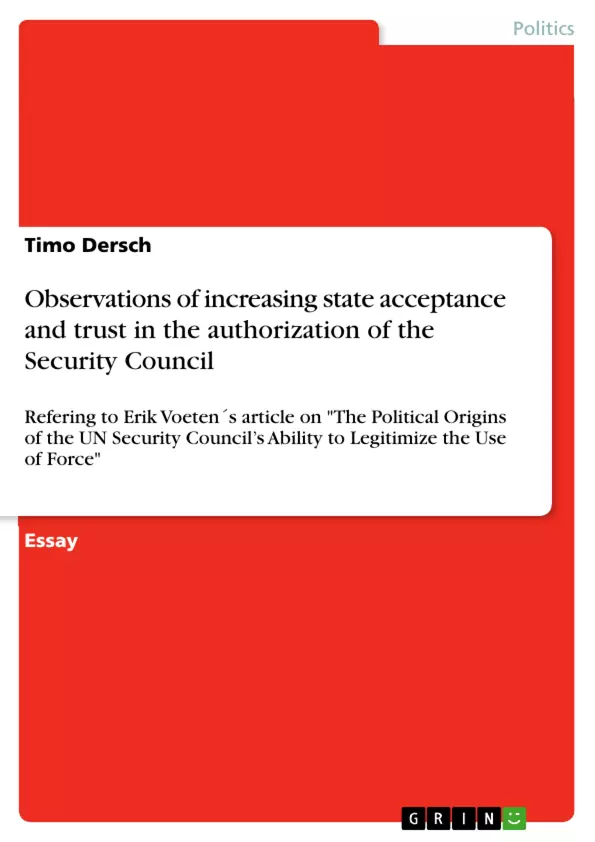In his article on The Political Origins of the UN Security Council’s Ability to Legitimize the
Use of Force, Erik Voeten states that the observation of state behavior could lead us to the
assumption that it is costly for a state to not get the Security Council’s (SC) approval for a
forceful action against another state. Costly, could on the one hand refer to an extreme
increase considering funding issues. Without proper legitimization, it seems to be harder for
states to find cooperatives because, “governments are more willing to cooperate voluntarily
once the SC has conferred its blessing” (Voeten 528). This leads to higher funding costs for
the operating state. On the other hand, the costs of a unilateral act might lie in the decline of
support and reputation a state government gets within the international society and amongst
its own population in general. Therefore, Voeten seems to argue that political elites do not
necessarily consider the SC as an, “independent judgment on the appropriateness of an
intervention”, but rather behave rationally in trying to minimize the costs by getting, “political
reassurance about the consequences of proposed military adventures” (527). Why does this
institution possess the legitimization to give them this reassurance? And to what extent does
this legitimization lie in the legal structure and norms it has incorporated? The following
essay shall deal with Voeten’s observations of increasing state acceptance and trust in the
authorization of the SC, and his explanations for this process. Furthermore, it shall focus on
the factor of legal norms and argue for a high importance of the legal norms influence while
constituting and providing the foundation of the SC’s status in the international society. In
connection to this I will highlight the critique which was raised by several scholars and
politicians as well, that todays structure of the SC might not be appropriate anymore and
restructuring could help in continuing its increase in legitimacy.
Inhaltsverzeichnis (Table of Contents)
- The Political Origins of the UN Security Council’s Ability to Legitimize the Use of Force
- The UN Security Council: Legitimization and Legal Norms
- Legitimization and Trust in the Legal Norms
- The Future of the UN Security Council: Restructuring and Legitimacy
Zielsetzung und Themenschwerpunkte (Objectives and Key Themes)
This essay examines Erik Voeten's argument that states are increasingly accepting of UN Security Council (SC) authorization of military actions, seeking to understand the reasons behind this trend and the role of legal norms in this process. It particularly focuses on the influence of legal norms on the SC's legitimacy within the international community.
- The increasing acceptance of UN Security Council authorization of military actions by states.
- The role of legal norms in shaping the UN Security Council's legitimacy and its ability to legitimize the use of force.
- The significance of the UN Charter and customary international law in the context of the UN Security Council's decision-making processes.
- The potential for restructuring the UN Security Council to enhance its legitimacy and representation.
- The limitations of the UN Security Council's authority in light of the behavior of powerful states, such as the United States.
Zusammenfassung der Kapitel (Chapter Summaries)
- This chapter analyzes Voeten's observations of increased state acceptance of the UN Security Council's authorization of military actions and explores his explanations for this trend.
- The chapter examines the role of legal norms in shaping the UN Security Council's legitimacy, highlighting the significance of the UN Charter and customary international law.
- The chapter explores the potential for restructuring the UN Security Council, arguing for a more inclusive and representative structure to enhance its legitimacy.
Schlüsselwörter (Keywords)
This essay examines the UN Security Council's legitimacy, the role of legal norms in international relations, the use of force, state behavior, and the need for potential restructuring of the UN Security Council. It also explores the concept of customary international law, particularly peremptory norms (jus cogens), and the significance of state practice in shaping international law.
Frequently Asked Questions
Why do states seek UN Security Council approval for military action?
States seek approval to minimize political costs, ensure international legitimacy, and gain better domestic and international support for their actions.
What are "legal norms" in the context of the Security Council?
They are the established rules and principles, such as the UN Charter and customary international law, that govern the use of force and define the Council's authority.
Is the UN Security Council still appropriate in its current structure?
Many scholars argue that the current structure is outdated and needs restructuring to increase its representativeness and global legitimacy.
What is "jus cogens"?
Jus cogens refers to peremptory norms of general international law that are binding on all states and from which no derogation is permitted.
How does the Security Council legitimize the use of force?
Through resolutions that authorize military intervention, providing a legal and political "blessing" that encourages other states to cooperate voluntarily.
- Citar trabajo
- Timo Dersch (Autor), 2012, To what extent do legal norms relating to the use of armed force influence governments’ desire to secure Security Council endorsement of their military actions?, Múnich, GRIN Verlag, https://www.grin.com/document/206094



